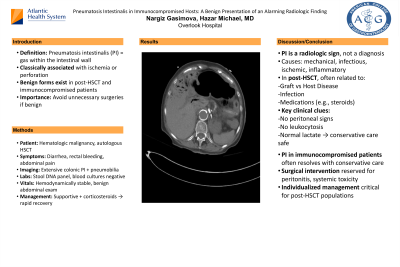Tuesday Poster Session
Category: Colon
P4705 - Pneumatosis Intestinalis in Immunocompromised Hosts: A Benign Presentation of an Alarming Radiologic Finding


Nargiz Gasimova, MD
Overlook Hospital
Summit, NJ
Presenting Author(s)
1Overlook Hospital, Summit, NJ; 2overlook hospital, Summit, NJ
Introduction: Pneumatosis intestinalis (PI) is a radiographic finding characterized by gas within the wall of the gastrointestinal tract. While it is classically associated with life-threatening conditions such as mesenteric ischemia or bowel perforation, not all cases are clinically significant. In immunocompromised individuals, particularly those undergoing hematopoietic stem cell transplantation (HSCT), PI can be a benign finding and may be managed conservatively. This distinction is critical in avoiding unnecessary surgical interventions.
Case Description/Methods: A patient with a history of hematologic malignancy and recent autologous HSCT was evaluated for diarrhea, rectal bleeding and abdominal pain. Cross-sectional imaging revealed extensive colonic PI and pneumobilia. The patient was hemodynamically stable with a benign abdominal examination. Stool DNA panel and blood cultures were negative. Given the absence of systemic toxicity or signs of peritonitis, a non-operative approach was adopted. Supportive management and corticosteroid therapy, for graft vs host disease, led to full clinical resolution and rapid discharge.
Discussion:
PI is a radiologic sign rather than a diagnosis and can occur in association with mechanical, infectious, inflammatory, or ischemic conditions. In immunocompromised hosts—such as those with HSCT—PI may be related to GI manifestations of graft-versus-host disease, infections, or medication effects. Studies suggest that in the absence of peritoneal signs, leukocytosis, or elevated lactate, conservative management of PI is often safe and effective, especially in immunocompromised patients. Equally important is distinguishing pneumobilia from portal venous gas on imaging. Portal venous gas appears more peripheral, and it branches; it is often a sign of critical illness such as bowel ischemia, requiring urgent evaluation. Pneumobilia, in contrast, is centrally located, more than 2 cm from liver edge, and usually signifies a benign finding such as prior biliary procedures. PI can range from a benign incidental finding to a marker of life-threatening pathology. In immunocompromised patients, particularly post-HSCT, PI without peritoneal signs or systemic toxicity often responds well to conservative therapy. Accurate radiologic interpretation and careful clinical assessment are essential in determining the need for surgical versus supportive management. This case highlights the importance of individualized care in managing PI especially in high-risk populations.
Disclosures:
Nargiz Gasimova, MD1, Hazar Michael, MD2. P4705 - Pneumatosis Intestinalis in Immunocompromised Hosts: A Benign Presentation of an Alarming Radiologic Finding, ACG 2025 Annual Scientific Meeting Abstracts. Phoenix, AZ: American College of Gastroenterology.
